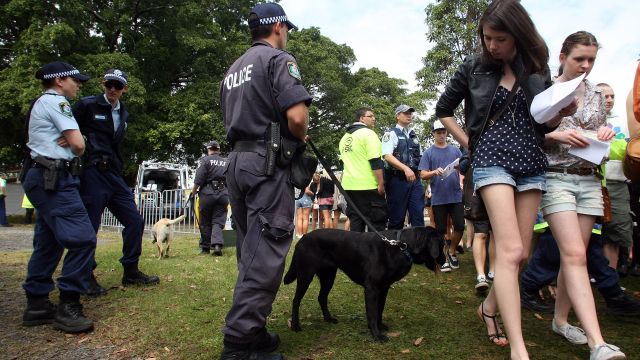
A groundbreaking report was released last month on the future of drug policy in Australia. The report, Can Australia respond to drugs more effectively and safely? openly acknowledged the failure of Australia’s punitive drug policies and called for a steady path towards decriminalisation.
Launched by former Liberal Premier of Victoria Jeff Kennett and former Premier of New South Wales Bob Carr, the report was produced by independent think tank Australia21. It was based on views expressed at a roundtable headed by former Australian Federal Police Commissioner Mick Palmer. Other participants included former assistant commissioners, former heads of corrective services and a former director of public prosecutions — all professionals responsible for the implementation of current drug policies.
The report concluded that Australia’s current system is “badly broken, ineffective and even counterproductive to harm minimisation aims of Australia’s national illicit drugs policy”.
The statistics on Australia’s current measures for curtailing illicit drug trafficking and use are sobering. According to the Australian Bureau of Statistics, in 2016 illicit drug offences were the most common offence nationally, with 81,160 offenders recorded. The number of offenders has risen 48% since 2008. Of these offenders, 67% were charged for possession and/or use of illicit drugs. Young people aged 20-24 had the highest offender rate of any age group.
The Australian Institute of Health and Welfare has compiled statistics on methamphetamine use in Australia over the past few years. It starkly concluded that usage is highest among individuals in the most vulnerable and/or persecuted sectors of our society: unemployed people are 2.7 times more likely to use methamphetamines than the general population, and those with very high levels of psychological distress are more than six times as likely.
The government spends billions of dollars on drug law enforcement each year. This report concludes that illicit drug use should be seen as a community health problem, and government spending should be diverted from punitive measures to funding health and social infrastructure projects.
Australian leaders cannot ignore these important, considered arguments for a pathway towards decriminalisation. Globally, the evidence against prohibition and punitive drug policy has been mounting for decades.
The US has been the world leader in implementing harsh, disciplinary drug policies. The Nixon government introduced a series of reforms then labelled the “war on drugs” in 1971. These reforms implemented the strict control and prohibition of illicit drugs, from manufacture through to personal use of banned substances.
Prosecution and mandatory sentencing laws for possession have had a disastrous effect on US society. Incarceration rates have escalated dramatically in the last half-century, particularly affecting African-American citizens and socio-economically vulnerable communities.
According to the National Association for the Advancement of Colored People, African Americans represent 12% of the total population of drug users but 38% of those arrested for drug offences and 59% of the state prison population on drug offences.
The cost, both social and financial, of housing the largest prison population of any nation on earth, with nearly half of all inmates imprisoned on non-violent drug offences, is astronomical.
In stark contrast, Portugal is leading the world by example with its drug policies. In 2000, Portugal implemented sweeping reforms decriminalising drug possession and funding and directing users in possession of “hard” drugs such as heroin and cocaine to treatment programs, as opposed to charging them with criminal offences.
Portugal’s drug-related mortality rate was three per million citizens in 2016, as opposed to ten per million in the Netherlands, and 44.6 per million in Britain; both nations with punitive drug policies similar to Australia. Treatment programs and funding for Portugal’s universal healthcare system the Servico Nacional de Saude, have improved key public health markers, including HIV infection rates, which have fallen by more than 90% according to think tank Transform.
If Australia can adopt a progressive drug policy similar to Portugal’s, many successful programs currently being trialled will have the potential for a large increase in funding and support.
One contentious, but evidentially successful piece of infrastructure being trialled in Australia is medically supervised injecting centres (MSIC). These are facilities where people can use drugs under the supervision of health professionals. Australia currently operates only one MSIC in Kings Cross, Sydney. People who use this facility have access to clean injecting equipment, as well as emergency care and other health services. According to the Alcohol and Drug Foundation of Australia, ambulance call-outs to Kings Cross have reduced by 80% since the MSIC was opened, and 5925 overdoses have been managed without a single fatality.
Reforms suggested by the Australia21 report would expand on these vital programs and facilities and contribute to the betterment of Australian communities. Suggested goals for policy reform in the report include redirecting funding from law enforcement to medical treatment, and non-judgemental education campaigns on the safe use of drugs. An increase in the availability of needle and syringe programs through facilities like MSICs, including for those currently in custody, was another recommendation.
Decriminalising illicit drug use in Australia is the pathway to a better society. Acknowledging and addressing underlying causes of drug abuse, such as poverty and racism will lead to better health and economic outcomes for all Australians. Experts have concluded that it is time to end the failed war on drugs, and voices from both the right and left of the political spectrum are beginning to reach a consensus on the issue.
Like the article? Subscribe to Green Left now! You can also like us on Facebook and follow us on Twitter.